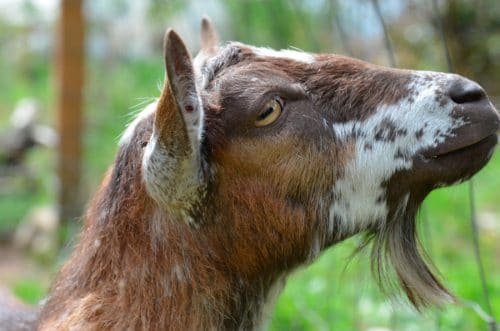 Mi’lady lords over her domain on the Grubaugh farm in Longbranch. Photos: Lisa Bryan, KP News
Mi’lady lords over her domain on the Grubaugh farm in Longbranch. Photos: Lisa Bryan, KP News
Stopping to chat at the market one day Frank Grubaugh says, “Well, we’ve got to run now—we’ve got seven kids at home.”
His wife Linda leans in and whispers, “We have goats.”
The Grubaughs are both retired. They live in Longbranch along with a small herd of Nigerian Dwarf goats and a half-crazy rescue dog named Bruno who thinks he’s a Nigerian Dwarf too.
When the Grubaughs first started talking seriously about goats, the idea was mostly to use them to keep encroaching Himalayan blackberries at bay. Nigerian Dwarf goats? What do you think? Well, wouldn’t that be cool? They are smaller, tamer and easier to handle than other dairy goats breeds. It helps that they usually top out at 75 pounds.
Frank says they started four years ago with two females––one mature red, Martha, and her daughter, Mi’lady. Neither Frank nor Linda had any farm experience but, why not? It’ll be fun.
They read everything they could to learn about the breed; how to care for them, feed them, fence, house and breed them to keep everyone in their herd happy, healthy and safe from harm. The Grubaughs enjoy taking country walks and when they do, the goats trail close behind. Goats are herd animals and Frank says they do really well on walks because they naturally want to stay with the group. No leashes are required, the goats pretty much fall into line behind the leader. Bruno, the crazy dog, races ahead of Frank and Linda. The goats quickly follow Bruno, which seems to make him feel like he’s king of the hill. Bruno begins barking and chasing his tail in circles to show off. Frank says people get a real kick seeing all of them out on the road.
The Grubaughs’ goats had kids in April, seven in all— two females and five males this time. At two weeks old, they are already running, jumping and playing kid games. The more they are handled at this age by humans, the tamer they’ll be as adults. So, since they will need homes for most of these kids, the Grubaughs force themselves to cuddle the goats, one at a time—for the goats’ sake, of course. Like all kids, they grow up fast and in the blink of an eye; the kids are nearly four weeks old. Frank says they are already more fun now. In the summer he and Linda pull up their chairs outside the fenced area and watch the goats play. They run, they jump and nearly fly through the air with ease. The goats are a riot. Martha, Mi’lady, Boots and Oreo (Frank’s “girls”) love their goat cookies and will happily eat them right out of your hand and come begging for more. Still, as friendly as these goats are with humans, they need to live with other goats in a herd, even if it’s a small one.
“We really love our goats,” Frank says. “And goat milk is delicious—there’s nothing like it.” A natural progression for goat fanciers is making yogurt and farmstead cheese. The Grubaughs were newbies to cheese making, so they hit the books to learn how. Nigerian Dwarfs breed year-round, so it’s possible to stagger breeding for a year-round milk supply.
For people not interested in raising goats for their milk, wethered (neutered) male Nigerian Dwarfs make wonderful pets and are often sought for use as 4H projects. Frank’s word to the wise: “Human kids grow up quickly and move along too. The lifespan of this breed is about 14 years, so be prepared to continue caring for them after your children move on.”
While some folks describe Nigerian Dwarfs as dogs masquerading in colorful goat costumes, don’t be tempted to treat them like dogs. They live outside and need to graze. Remember those Himalayan blackberries they’re supposed to control?
UNDERWRITTEN BY THE FUND FOR NONPROFIT NEWS (NEWSMATCH) AT THE MIAMI FOUNDATION, THE ANGEL GUILD, ADVERTISERS, DONORS AND PEOPLE WHO SUPPORT INDEPENDENT, NONPROFIT LOCAL NEWS